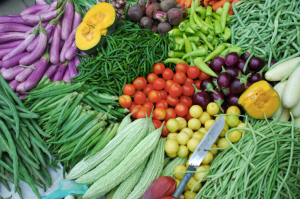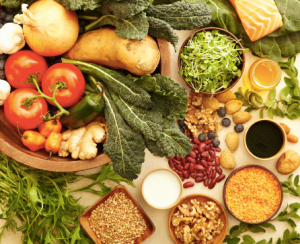 The Best Foods for a Healthy Body
The Best Foods for a Healthy Body
Clients, friends, and even family members often ask me what diet I recommend. If you know me, you know I don’t believe in diet fads or gimmicks that promote rapid weight loss. Rather, I strongly support a diet rich in whole foods focused on nutritional balance. This means, primarily consuming fresh fruits and vegetables, quality whole grains and lean meats, such as: wild fish and organic, cage free chicken. A whole foods diet is focused on consuming foods in their most natural state, with minimal processing and no added preservatives or chemicals.
I want to dive a little deeper into what defines a processed food versus a whole food, as there seems to still be much confusion on this topic.
What Is A Processed Food

Processed foods are everywhere – some are processed in order to slow spoilage and make for easy storage, others are there to make our life easier. Snack chips, candy, sodas, processed meats, cake mixes, breads, frozen dinners, and many other food items have been processed for our convenience. But, that convenience is costing us a lot in the way of healthy nutrients.
Disadvantages of Processed Foods:
- During processing, healthy nutrients, vitamins and minerals are removed
- Processed foods contain more additives and preservatives
- Processed foods are often high in sodium or sugar
- Processed foods may contain hidden allergens
- High-calorie, low-fiber processed foods contribute to overeating and weight gain because you don’t feel full as quickly as with high-fiber whole foods
- Gram for gram, processed foods cost more
Processed Food Components to Avoid
- High-fructose corn syrup
- Trans fats
- Artificial sweeteners
- Food in a box, can, or package
- Artificial colorings
- Food additives such as potassium bromate, propyl, sodium nitrate, monosodium glutamate
What Is A Whole Food

By contrast, whole foods are minimally processed before being consumed. The food is in its natural state, with all its vitamins and nutrients. The health benefits are numerous when selecting whole grains, meats, fruits, vegetables, and non-homogenized dairy products instead of frozen pizza and meal-helpers.
Benefits of whole foods:
- Rich in phytochemicals –plant chemicals that have protective or disease preventive properties.
- Contain more vitamins and minerals than processed foods. Although some processing enriches foods with vitamins and minerals, overall whole foods are more nutrient dense
- Contain more fiber and beneficial fats
- Whole grains offer several benefits including the slowing down of the digestive process, allowing better absorption of nutrients; the fiber content helps regulate blood sugar by slowing down the conversion of starches into glucose; they allow healthful bacteria to keep disease-producing bacteria in check; they have strong anti-oxidant properties to help protect the body against free radicals, as well as phyto-estrogens and phytochemicals that break down carcinogenic substances. Grains also have a more concentrated amount of these phytochemicals than fruits and vegetables.
- Nutrient dense foods are generally lower in calories
Whole food components to eat
- Omega-3 foods: wild salmon, sardines, herring, Omega-3 eggs
- Beans or legumes including soy milk, soybeans, lentils, chickpeas
- Nuts, especially almonds, walnuts, macadamia nuts, and pecans
- Seeds such as pumpkin, sunflower, flax, and chia
- Fresh fruits and vegetables, especially
- Asparagus, broccoli, kale, spinach, cabbage, and brussel sprouts
- Berries, cherries, peaches, plums, pears, rhubarb, and apples
- Whole grains like barley, quinoa, farro, amaranth, buckwheat, kasha, millet, and whole grain rye
- wild fish, free range chicken and grass fed beef
Give your body the best foods possible, as often as possible
Overall, whole foods are the whole package – they keep your body healthy with nutrients, fiber, and antioxidants, and help regulate your supporting systems in the process. For the best places to find fresh, whole foods you should first look to your local farmers markets. For those of you in North Florida, check out my curated list of farmers markets throughout Jacksonville and North Florida.

It’s awesome that you elaborated on whole foods containing more vitamines, making them more nutrient. My wife and I have been debating about changing our diet, and we were thinking about including more natural foods. We will visit a food store in our area and get some organic stuff, like vegetable sand fruits.
It’s awesome that whole foods have more vitamins and minerals than processed ones, as well as fiber and healthy fats. My roommate and I are trying to eat healthier and love making salads from fresh produce. I’d love it if we could find a local food market to go to for fruits and veggies.